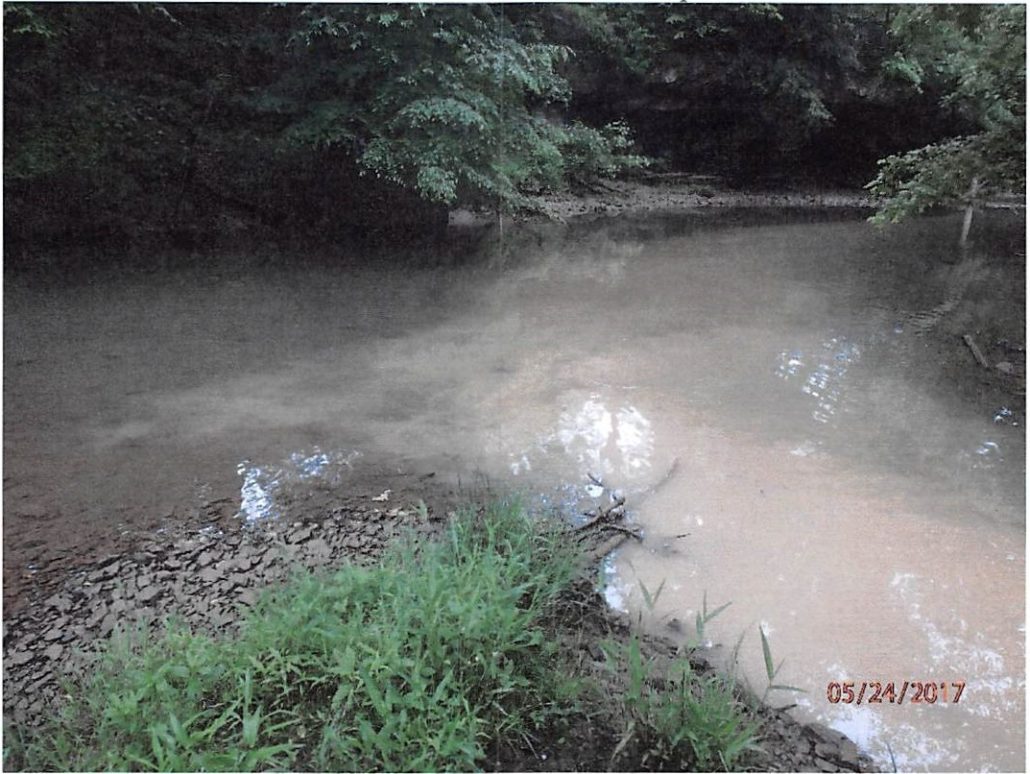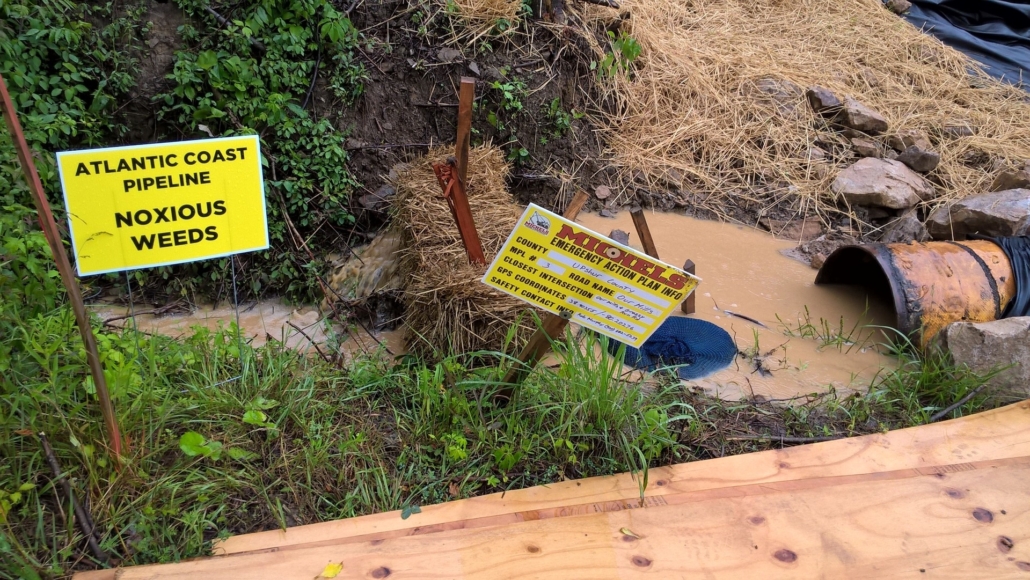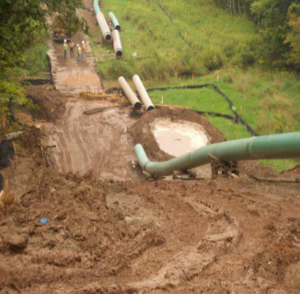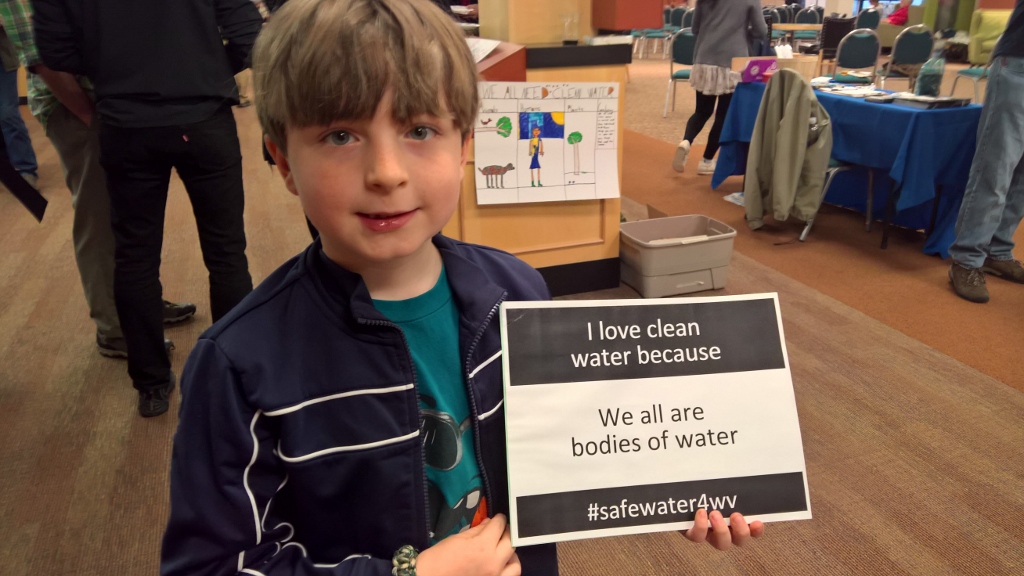Ask WVDEP to Hold Rover Pipeline Accountable for Water Pollution – Act by 5PM Today
Sediment plume entering Meathouse Fork caused by the Rover Pipeline. Photo by WVDEP.
This week WV Rivers submitted comments on a penalty issued by WVDEP to the Rover Pipeline for series of water quality violations. Since April 2017 Rover has received 18 water quality violations and two cease and desist orders from WVDEP.
We commend WVDEP for holding Rover accountable for their water quality violations, but we believe the fine to be inadequate due to Rover’s repeated negligence and disrespect of environmental law. Reclamation of the damaged streams alone will exceed the current fine. We’re asking WVDEP adjust the penalty to fit the severity of the Rover’s violations and to set an example for other pipeline companies. View our letter to WVDEP here.
You can add your voice! Share with WVDEP that you want them to hold Rover Pipeline accountable for their water pollution. Send a letter 5PM, TODAY, 7/13.
WV Rivers Volunteers Identify Pipeline Impacts
Failed sediment and erosion control best management practices on Grapevine Branch in Upshur County reported by a volunteer monitor.
WV Rivers has been busy working hard to prevent the massive pipelines crossing the state from harming our rivers and streams. Just this month we were successful in petitioning a federal court to stop stream crossings of the Mountain Valley Pipeline due to an illegal permit, and have submitted a similar petition for the Atlantic Coast Pipeline.
But damage is already happening. That’s why we partnered Trout Unlimited to launch a volunteer pipeline visual assessment program to identify and report water quality impacts from pipelines. In recent weeks, volunteers have helped us document and report 8 incidents from 4 major pipelines in West Virginia. WV Rivers submits these reports to the WVDEP who follow-up by sending inspectors to address the issues. In one instance, the Atlantic Coast Pipeline voluntarily stopped construction to fix the issues causing water quality impacts.
We’re so thankful for all our volunteer monitors who are on the ground identifying pollution– it’s making a difference! Learn more about how you can identify and report pipeline impacts here.
New Pipeline Resources at WVRivers.org
It’s a full time job trying to stay on top of everything that’s going on with pipelines. WV Rivers is here to help!
That’s why we created a new webpage on the major natural gas pipelines in West Virgina. Our pipeline resource page will help you make sense of the news and better understand the issues.
We’ll be updating this page as news breaks and we develop additional resources on pipeline related issues.
What’s Next for Water Quality Standards
Thanks to all of you who spoke up as part of WVDEP’s triennial review of our water quality standards – we know nearly 600 comments were submitted!Now, the WVDEP will review and respond to all of the public comments and will file their final rule by July 27.
Then the rule goes to the WV Legislature. Its first stop will be the Legislative Rule-Making Review Committee where amendments can be made to any of the standards. Once it passes committee, it will head to the full legislature in January for debate and passage.
We still have a long way to go and will need your involvement every step of the way. Next month, we’ll give you our analysis of the various stakeholder comments and the final rule filed by WVDEP.
Ohio River Could Lose Important Protections
In our June WV Rivers’ News we shared that the Ohio River Valley Sanitation Commission (ORSANCO) voted to discontinue their important practice of setting pollution limits for the entire length of the Ohio River. Now, that decision is out for public comment.
We’re disappointed in ORSANCO’s decision and are collecting information on what it means for the Ohio. Click here to learn more and find out about upcoming public hearings and informational webinars.
Stay tuned! We’ll share more information and tips for submitting your comments soon.
WV Rivers in the News
Water in Appalachia Needs a Trillion Dollar Solution
WV DEP to take comments on water quality standards
Atlantic Coast Pipeline Permit Under Fire from Environmental Advocates Vital federal fund could be lost without renewal
Appeals Court Stays Crucial MVP Permit in West Virginia, Putting 2018 Startup in Jeopardy
Clean water advocacy group raises concerns over Pineville Municipal Water source
Federal court issues stay on portions of Mountain Valley Pipeline
Federal circuit court issues stay on MVP permit
Appeals court issues stay of permit for Mountain Valley Pipeline in W.Va.
Judges reverse Clean Water Act decision
Public comment period open on water quality standards
Two more notices of violation issued to Mountain Valley Pipeline
Trade war jeopardizes China’s huge investment in creation of new ‘cancer alley’ in Appalachia
Rover Pipeline Fined For Water Pollution Violations
Natural gas pipeline agrees to pay $430,000 penalty for water pollution violations









